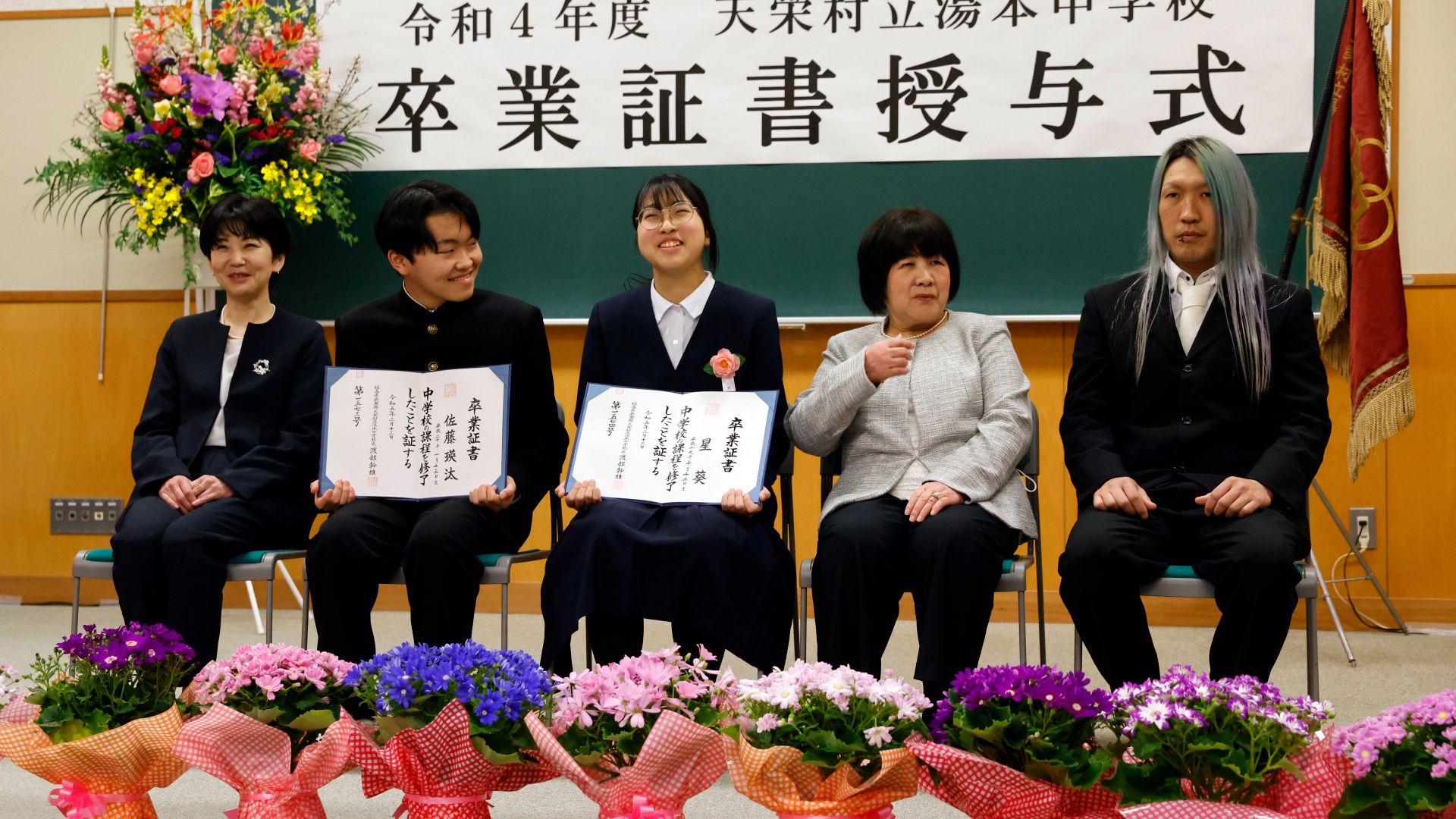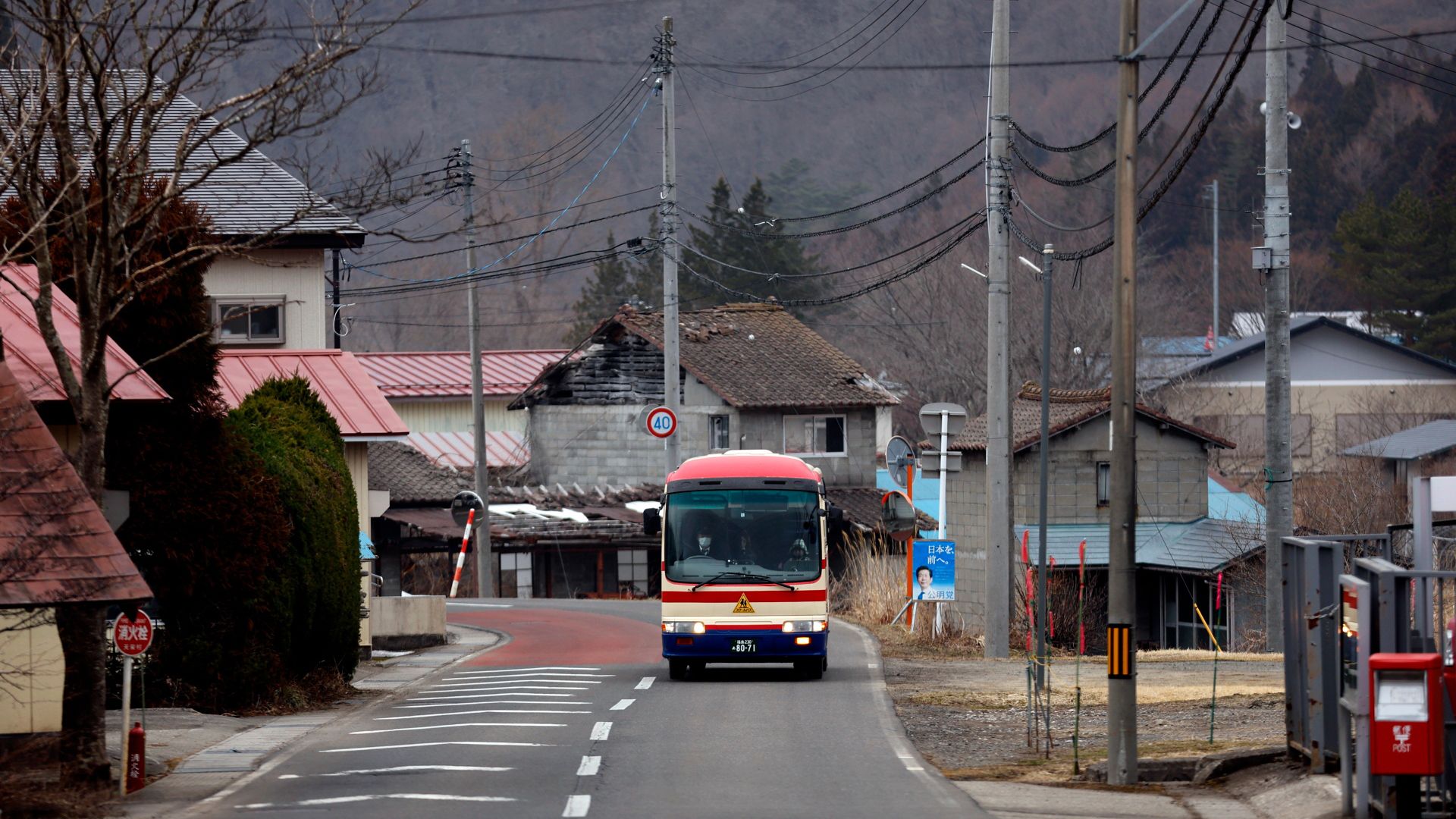Eita and Aoi walk along the corridors of Yumoto Junior High School a few days before graduation and the school’s closing ceremony in Ten-ei Village (Source: Reuters)
A rapid decline in Japan's birthrate has given rise to the number of school closures. The closure of schools has added to the challenges faced by already struggling regions like Fukushima Prefecture.
Eita Sato and Aoi Hoshi's footsteps echoed in polished halls once crowded and noisy with students as they walked towards their junior high school graduation ceremony.
The two were the only and final graduates of Yumoto Junior High in a mountainous region of northern Japan.
When the school year ends on Friday, the 76-year-old institution will close its doors for good.
"We heard rumours about the school closing in our second year, but I never expected it to happen."
"I was shocked," Eita, who is 15, like Aoi, said.
As Japan's birthrate falls faster than expected, school closures have increased, particularly in rural areas such as Ten-ei, a mountainous skiing and hot spring area in Fukushima prefecture, dealing a further blow to already depopulated areas.
Falling birth rates are an Asian regional issue, with rising child-rearing costs dampening birthrates in neighboring South Korea and China. However, Japan's situation is particularly dire.
Prime Minister Fumio Kishida has pledged "unprecedented measures" to increase birth rates, including doubling the budget for child-related policies, and says the educational environment must be maintained.
So far, however, little has been accomplished.
According to government estimates, births will fall below 800,000 in 2022, a new record low and eight years earlier than expected, dealing a crushing blow to smaller public schools that are often the heart of rural towns and villages.

Eita and Aoi attend a photo session with Eita’s mother Masumi and Aoi’s grandmother Hisako (second from the right), 68, and father Kazuhisa, 37, after the students’ graduation and the institution’s closing ceremony, in Ten-ei Village, Japan (Source: Reuters)
According to government data, approximately 450 businesses close each year. Between 2002 and 2020, nearly 9,000 businesses closed their doors for good, making it difficult for remote areas to attract new and younger residents.
"I am concerned that without a junior high school, people will not consider moving here to start a family," said Eita's mother, Masumi, a Yumoto graduate.
Fighting leads to friendship.
Ten-ei, a village of just under 5,000 people, with only about 10% of the population under the age of 18, is located in a peaceful rural area known for its rice and sake. On the mountains, there are hot spring inns, as well as ski rental shops and campsites. There are also signs warning of bears.
The village had over 10,000 residents at its peak in the 1950s, supported by agriculture and manufacturing. However, the growing inconvenience and remoteness of the area prompted residents to leave.
After the March 11, 2011 disaster at the Fukushima Daiichi nuclear plant, less than 100 kilometers (62 miles) away, Ten-ei experienced some radioactive contamination, which has since been cleaned up.
During its heyday in the 1960s, the Yumoto School, a two-story structure in the heart of the district, graduated about 50 students per year.
Photos of each graduating class hang near the entrance, transitioning from black and white to color - with the student population visibly and abruptly dropping from around 2000.
There is no image from the previous year.
Eita and Aoi, who had been together since they were three, were in a five-person class throughout elementary school but were the only two to continue their education at Yumoto.
Their desks were side by side in the center of a classroom designed for 20, and they "fought a lot" during their first year, according to Eita.
However, tensions subsided, and they adapted, attempting to simulate a typical school experience. They chose pair sports, primarily table tennis, for the after school club activity, which is an important part of Japanese education.
Teachers pinned corsages on the laughing graduates on graduation day, which is usually a job for younger students.

The village school bus drives along an empty street in the morning, in Ten-ei Village (Source: Reuters)
"People are very disappointed that there is no longer a source of culture," principal Mikio Watanabe said of the decision to close, which was made in consultation with village residents. "Without the children's voices, the place will be quieter."
Experts warn that closing rural schools will exacerbate national disparities and increase pressure on remote areas.
"The closure of the school means that the municipality will eventually become unsustainable," said Touko Shirakawa, a sociology lecturer at Sagami Women's University.
Ten-ei will talk about repurposing the school. In other parts of Japan, abandoned schools have been converted into wineries or art museums.
Aoi, who aspires to be a nursery school teacher in her hometown, will begin attending a different school than Eita in April.
"I am not sure if there will be any children in the village when I am a teacher," Aoi admitted. "But if there are, I would like to return."
Source: Reuters